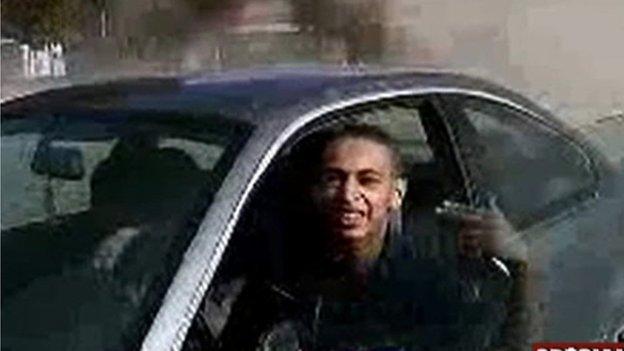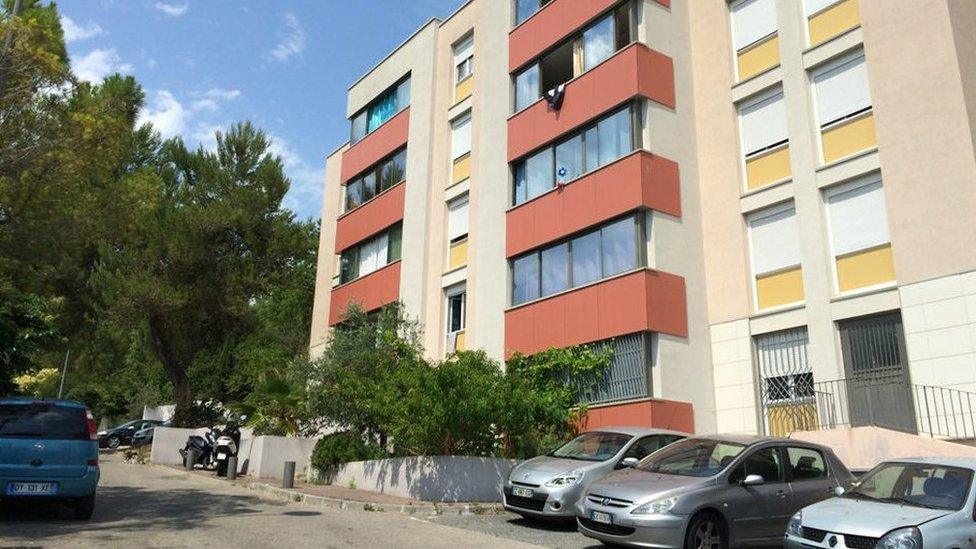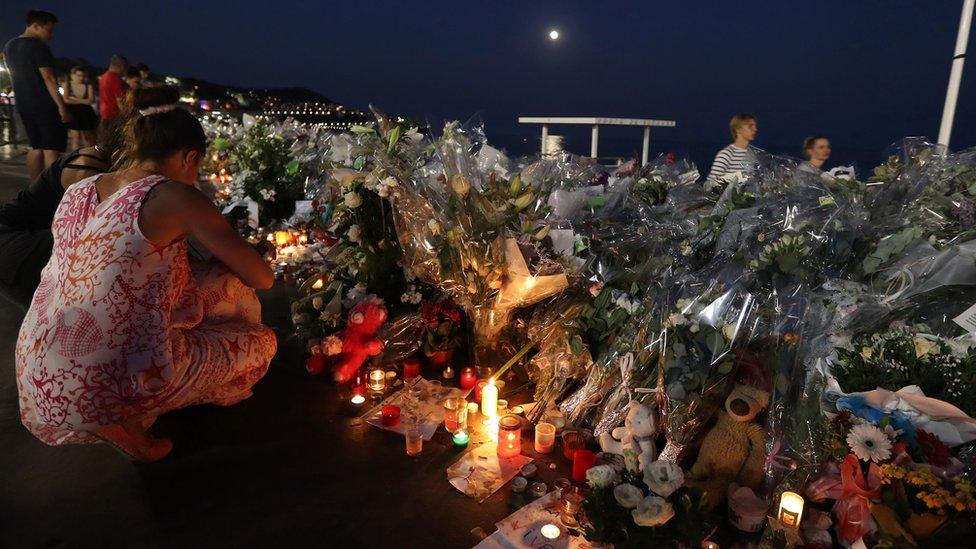Attack on Nice: My brother the jihadist Mohamed Merah
- Published
Abdelghani Merah tells the story of his jihadist brother
The name I was sent jumped from the screen. The activist fighting Islamic radicalism on the French Riviera was Abdelghani Merah.
He had the same surname as Mohamed Merah, the 23-year-old extremist who killed seven people in south-western France in 2012 before being shot dead by police.
I rang Abdelghani, introduced myself as a journalist reporting on jihadism in the Nice area, and remarked on the coincidence of his name.
"Mohamed Merah was my little brother," he said in a soft Toulouse accent. I was startled.
Read more from Henri Astier in Nice:
We meet on Bastille Day. Abdelghani is wearing a T-shirt and a fake LA Dodgers cap. We find shelter from the sun at a cafe by a marina.
The 39-year-old tells me the story of the ultimate dysfunctional family.

Mohamed Merah went on a 12-day killing spree, targeting soldiers and Jewish schoolchildren
The seeds of Mohamed Merah's radicalisation, he contends, were planted during childhood. Abdelghani always uses his brother's full name, as if he was a stranger.
Their Algerian-born mother and father, he says, "hated France and everything that embodies its diversity".
Life at home was rife with violence and intolerance. Their father spent five years in jail for trafficking in cannabis.
But such a broken childhood, he insists, is no excuse for his brother's crimes later in life - or his own.
"I experienced the same hardship as Mohamed Merah," he says. "We both were put into care. We both did time in prison.
"But from the age of 10, I chose to resist my parents' message of hatred."
His siblings, Abdelghani says, did not. He was regarded as the black sheep of the family after marrying a non-Muslim woman in the mid-1990s.
Phantom limb
His other brother Abdelkader - or "Kader" - was a violent man. In 2003, he stabbed Abdelghani seven times, and was jailed as a result.
As Kader was also drifting towards radical Islam at the time, Abdelghani reported him to the security services as a potential terrorist. "The warning was ignored," he recalls. "They thought it was just a family dispute."
Abdelghani pauses. I notice that his right arm is limp. He presses on it, wincing in pain.
"Can I help?" I ask.
"I'll be all right. I had a motorcycle accident in 2008 and I was in a coma for days. I almost died," he says, adding ruefully: "Once again."
"I have no sensation in this arm, but I have phantom limb pain."
The pain passes. Abdelghani looks into the distance, before picking up the story in his drawling Toulouse voice.
He is convinced that Kader, the middle brother, was responsible for much of Mohamed's radicalisation. In the late 2000s, when Mohamed was in and out of prison, Kader drew him into local Salafist circles, he says.
A 2012 TV documentary on the Merah affair suggests Kader and his sister Souad knew about Mohamed's attempts to join al-Qaeda by travelling to Afghanistan and Pakistan in 2010-2011.
Even more seriously, Abdelghani maintains that Kader was an accessory to the 2012 shootings, and gave evidence to police to that effect.
As a result, Kader was arrested and is now awaiting trial on terror charges, which he denies. Their sister Souad has never faced any charges.
These days Abdelghani fights jihadism by speaking to youths in rough parts of the Nice area, where the memory of his late brother is very much alive.
"Mohamed unleashed a kind of madness on the housing estates," he says. "I used to be a youth worker. In the old days they used to call the French 'Gauls' - now they call them 'infidels'."
Could this be adolescent provocation? "Often it is no more than that," Abdelghani concedes. "But many parents nurture a sense of grievance. As soon as their kids experience discrimination, they tell them they cannot succeed because they are Arab.
"There's some truth in this, but you don't talk to your children like that. They must be told not to give up."
This is the kind of positive message Abdelghani says he gives to his own 20-year-old son. "Whenever he is rejected because of the colour of his skin, I say: these guys are jerks, you don't want to work for them anyway."
Because of his strong stance against radicalism and his very public break with his relatives, Abdelghani has received threats.
He is not in hiding, but he is careful. He never reveals exactly where he lives.

The Riviera has had trouble with jihadists for years: people flocked here for years to hear a preacher at a makeshift mosque
Nice has been a leading supplier of French jihadist fighters in recent years. I ask Abdelghani about the danger posed by those returning from Syria.
Border controls have been tightened and this is not the main threat now, he says. "What I fear most are frustrated nutters who couldn't go there and decide to take action right here."
It is now getting late. I wish Abdelghani the best and take my evening flight home from Nice.
The moment my plane lands in London I learn of the carnage on the Promenade des Anglais.

Read more on the attack on Nice
Brother of Nice victim: "You killed my sister, you're not a Muslim"

The next morning I catch up with him by telephone. He had been staying a few hundred yards from where the attacker struck.
"I heard people screaming 'He's got a gun', and thought they might be coming for me," Abdelghani says. "I panicked and grabbed a screwdriver."
I imagine Adbelghani standing there, holding the screwdriver with the only hand he can raise.

The lorry's deadly journey on the Promenade des Anglais began after 22:30 on Thursday 14 July
"Then I thought to myself: 'This is stupid.' If I'm going to die, I might as well die standing up.' So I just waited and things calmed down."
What does he make of the attack? "They're targeting civilians, and it's only the beginning," he says softly.
Abdelghani then recalls something Mohamed Merah, then 20, said during a stint in prison in 2009.
The words were retold in the 2012 TV documentary on Merah by the fellow inmate who heard them: "How many people do you think I can kill with a lorry?"